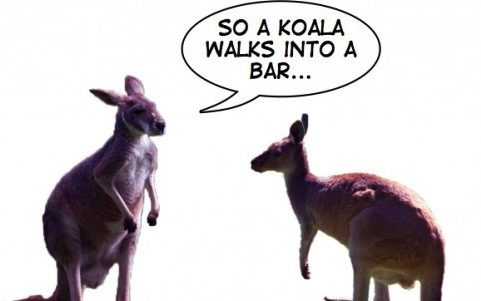“Um, I don’t get it”: Deciphering Aussie humour
HAVING a sense of humor is serious business here in Australia.
As Swinburne students pondered their futures at this month’s Careers and Employment Fair, funnyman Michael Connell – renowned for his clean and inoffensive stand up acts – took to a slightly different stage than those he was used to, to give a talk to international students on Aussie humor.
More accustomed to the low lights of comedy clubs, the self-professed comic geek was summoned bright and early on a Thursday afternoon for this gig. And despite his upcoming show’s title, I Am Super, Man, he arrived with his red undies tucked in.
The national sense of humor, Michael explained, came from Australia’s history as a convict colony.
“British and Irish humour are quite similar to Aussie humour because of our shared history; Australia was founded by the English, populated by Irish convicts, Scottish settlers, etcetera,” Michael said.
“Plus our TV is full of their comedy shows. Travelling around Ireland and the UK you get a sense of how the comedy of these different cultures all melted into one to sort of create a basis for Aussie comedy.”
As you can imagine, the humour is often dry, full of extremes, anti-authoritarian and ironic. As Queensland TV presenter, actor and comedian Mark Little once said: “the country itself is the ultimate joke; the wave you body-surf into shore after a day at the beach could contain a shark or a rip-tide and, when you get back, your house could have been burnt to the ground in a bush fire. That’s where the whole ‘no worries’ thing comes from.”
Graduate students might find it surprising that Australians are always up for a laugh, even while they are on the job. The tendency to keep work and play separate, which international students might have been taught back home, is seemingly absent from the Australian rule books. That does not mean Aussies don’t take their work seriously, it just means they like to have a bit more fun while they are at it.
But Michael said his humour crossed cultural boundaries better than he expected.
“I was really worried before the talk – Swinburne had asked me to perform some of my stand up at the start of the talk, and I really didn’t think they’d get any of the jokes,” he said.
“I was very surprised and relieved that they got almost everything. The students must have been studying really hard and practicing their English.”
But he said there were some funny moments during the talk where some jokes got lost in translation.
“I showed a clip from The Castle and I got a lot of questions about what jousting sticks are and why buying them out of The Trading Post was funny.”
[youtube]http://www.youtube.com/watch?v=dik_wnOE4dk&feature=related[/youtube]
Contrary to what you may suspect, Aussie humor, according to Michael, isn’t always distasteful and blunt.
“I don’t think comedy is inherently good or evil, it just depends how you use it. Sometimes Aussies have a bit of the tall poppy syndrome and use comedy to keep people down, which I think isn’t very nice.”
“I tend to agree with comedian Stewart Lee who argues that political correctness isn’t perfect and at times can be unwieldy, but it’s better than the alternative. I don’t know if comedy’s become too politically correct, but I’d rather do jokes that don’t demean or insult anyone based on their race, gender, etcetera anyway. It’s not really something I worry about.”
Ultimately, the trick to a good sense of humour is to be yourself – or at least a lightened up version. And maybe become a serial Aussie TV couch potato as part of your stay-home research.


